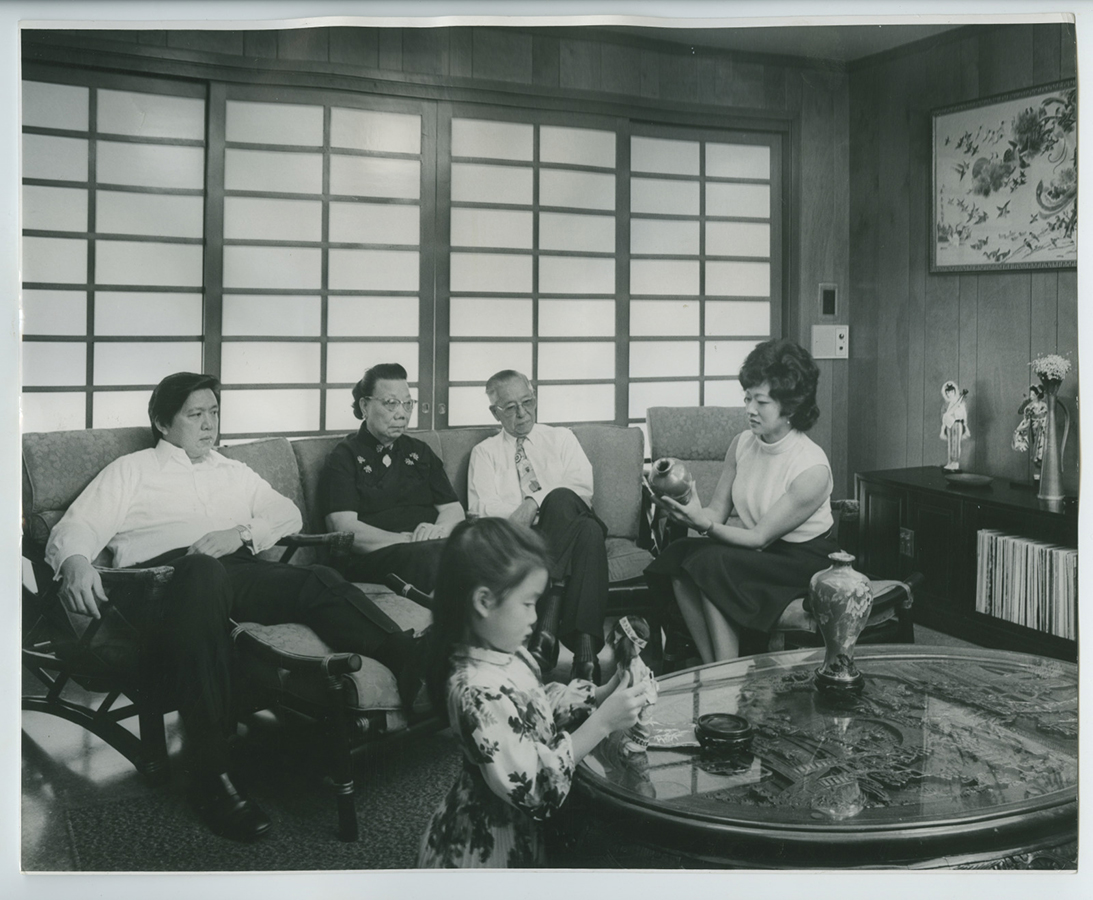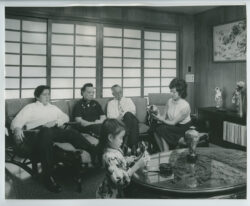Harry Lee
Harry Lee was the first Asian American elected to office in Louisiana and the first Asian American to serve as chief law enforcement officer of any major metropolitan area in the United States.

The Historic New Orleans Collection
Harry Lee seated at home with his family, 1972. From left: Harry Lee, Yip (Shee) Bing, Lee Bing, Lai Lee, and Cindy Lee (foreground).
Harry Lee served seven terms as sheriff of Jefferson Parish from 1980 until his passing in 2007. He was the first Asian American to be elected to office in Louisiana and the first Asian American to serve as chief law enforcement officer of any major metropolitan area in the United States.
Early Life
Born in New Orleans in 1932, Lee was the son of Lee Bing and Yip Shee, Chinese immigrants from Taishan (Hoishan) county, Guangdong province. Lee Bing himself grew up in New Orleans, as he was ten years old when he arrived in this country to join his father, Lee Soon, who owned a laundry in Algiers. Yip Shee immigrated as an adult after her marriage to Lee Bing. The Lee family owned a laundry in Uptown, New Orleans, where Harry Lee was born, the third of eight children and the eldest son.
When Lee was a teenager, his parents sold the laundry and opened Hoy Sun Restaurant and Bar in the Central Business District. Lee graduated from Francis T. Nicholls High School and completed an undergraduate degree from Louisiana State University in 1956. He was commissioned as an officer in the US Air Force and stationed at Lackland Air Force Base in San Antonio, Texas, when he met his future wife, Lai Woo. Lee was later assigned to the Strategic Air Command and was stationed at Dyess Air Force Base in Abilene, Texas, until he was honorably discharged in 1959. Lee remained an officer in the Louisiana Air National Guard, eventually reaching the rank of major general.
Beginnings of Public Service
By this time, Lee’s parents had opened House of Lee Restaurant in Metairie, where Lee served as a manager in the 1960s. While working in this role, Lee also served as president of the Louisiana Restaurant Association and attended Loyola Law School, completing a law degree in 1967. During this time, Lee volunteered as an aide to Congressman Hale Boggs, who became his mentor and encouraged Lee to seek public office. Lee practiced law for four years with classmate and future judge, Marion Edwards.
In 1971 Harry Lee was appointed as a federal magistrate judge for the Eastern District of Louisiana, where he served for five years. He also served as president of the National Council of US Magistrates and was a staff judge advocate in the US Air Force. In 1972 Lee joined US House Majority Leader Hale Boggs and House Minority Leader Gerald Ford in an official congressional visit to mainland China, becoming one of the first Chinese Americans to return to China since the Communist Revolution in 1959. In 1976 Lee was appointed the Parish Attorney for Jefferson Parish, where he served for three years.
Jefferson Parish Sheriff
In 1979 Harry Lee defeated four-term incumbent Al Cronvich for sheriff of Jefferson Parish. Except for the 1987 sheriff’s race, Lee won a decisive reelection in every subsequent race and became one of the most popular and high-profile elected officials in Louisiana. He even ran for governor in 1995 but withdrew before the election. During his long tenure as sheriff, crime rates and police response times remained low in suburban Jefferson Parish, even as the population grew and crime increased in neighboring Orleans Parish. Lee reformed the Jefferson Parish Sheriff’s Office (JPSO), increased pay, and modernized equipment and training. He also increased the number of women, African Americans, Asian Americans, and other minorities serving in JPSO. He appointed the first Black lieutenant and Black captain, and he protected and promoted gay sheriff deputies. Though often described as a conservative Democrat, Lee described himself as a pro-choice, “flaming liberal” on some issues, and “right of Attila the Hun” on others.
Despite his popularity, Lee was a controversial sheriff accused of several conflicts of interest and racial bias incidents. One high-profile incident took place in December of 1984. After a series of armed robberies and home burglaries on the East Bank of Jefferson Parish, Lee told reporters that his deputies would stop young Black men in “rinky-dink cars in predominantly White neighborhoods.” The statement was condemned by the NAACP, the Urban League, and by Black law enforcement officers, and the incident is one reason why Assistant District Attorney Art Lentini made the only serious challenge to Lee’s reelection in 1987. Another incident occurred in 2005 after Hurricane Katrina, when Lee approved the closure of the Crescent City Connection bridge to flood survivors attempting to escape the East Bank of Orleans Parish. Gretna police and JPSO deputies went so far as to shoot over the heads of survivors to prevent them from crossing.
Legacy
Lee was infamous for his honest, blunt, and inappropriate remarks, and he often said he would rather offend people than lie to them. He cultivated the public image of a “Chinese Cowboy,” beginning with his first political ad for sheriff in 1979, when he appeared walking on the levees of Lake Pontchartrain with his family while wearing blue jeans and a cowboy hat. He often rode a horse in Mardi Gras parades, throwing refrigerator magnets and sheriff stars to crowds. He also gained a reputation as a philanthropist and fundraiser for charitable causes, including Children’s Hospital of New Orleans and the National D-Day Museum. A lifelong Democrat, Lee was a popular fundraiser for other Democrats, including Dutch Morial, Edwin Edwards, and Bill Clinton.
Lee passed away in 2007 at the age of seventy-five. He is the father of Cynthia Lee-Sheng, who has served as president of Jefferson Parish since 2020.
